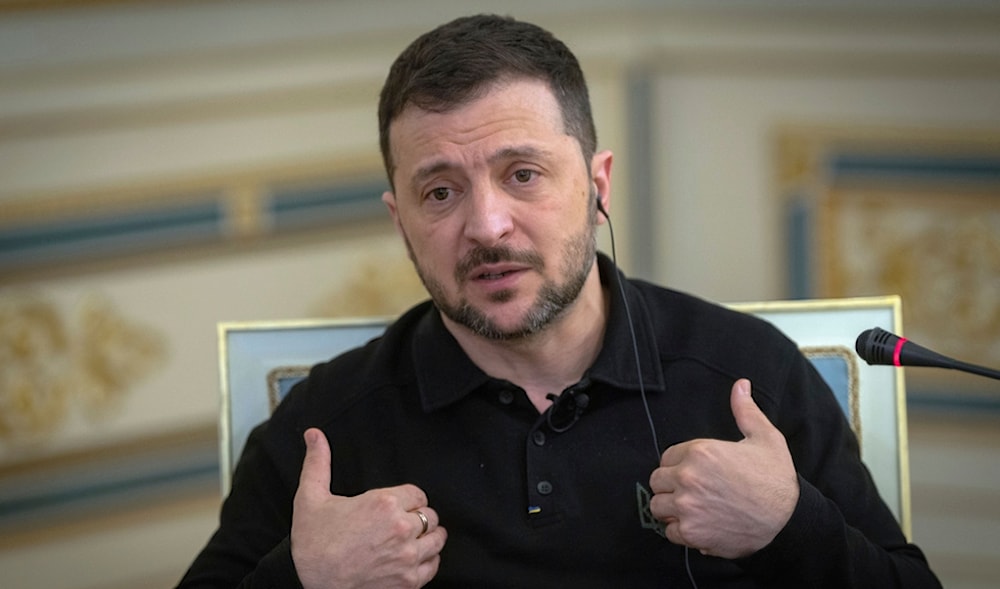Infighting takes over Kiev politics as US seeks war's endgame
Ukraine's opposition has accused Zelensky of prioritizing elections over war management, while he seeks Trump's support.
-

Ukrainian President Volodymyr Zelensky gestures as he speaks during an interview for The Associated Press in Kiev, Ukraine, Saturday, February 1, 2025. (AP)
Following the Russian-Ukrainian war's outbreak in 2022, Kiev's typically intense political scene was subdued under martial law. However, there are increasing indications of renewed activity as the United States focuses on bringing the war with Russia to a swift conclusion.
The United States has been urging Ukraine to hold elections, possibly by the end of the year, particularly if Kiev reaches a ceasefire agreement with Russia in the coming months, according to President Donald Trump's top Ukraine official in a statement to Reuters.
The Trump plan is still being developed, and no policy decisions have been finalized. However, White House officials have recently discussed urging Ukraine to agree to elections as part of an initial truce with Russia, according to two individuals familiar with the discussions and a former US official briefed on the election proposal.
Over the past week, one political faction in Ukraine has accused President Volodymyr Zelensky's administration of prioritizing elections over the war. Meanwhile, Kiev's mayor has alleged that a presidential appointee is obstructing his efforts, and opposition figures have been making trips abroad.
In recent weeks, former president and prominent opposition figure Petro Poroshenko has been seen meeting and shaking hands with various foreign officials but has insisted that his actions are unrelated to the elections, arguing that holding them would benefit Russian President Vladimir Putin and put Ukraine at risk during a critical time. "Our priority is to win the war," Poroshenko told Reuters.
However, his European Solidarity Party has accused Zelensky of attempting to exclude him from parliament and prioritizing "upcoming elections over managing the war."
There are also significant logistical hurdles. Serhiy Dubovik, deputy head of Ukraine's Central Election Commission, told Reuters that preparing for an election would take at least four to six months, considering the displacement of voters and extensive destruction. Millions of Ukrainians remain abroad and millions more are internally displaced with the devastation of frontline towns.
A Ukrainian government official claimed that Putin is attempting to manufacture a false pretext to avoid negotiations. While Ukraine remains committed to holding elections, the official stated, conducting them during a full-scale war is simply not feasible.
War of attrition pressures Ukrainian Army
It is noteworthy that Ukraine seeks Trump's support but has suffered thousands of casualties and defections while holding out against Russia.
On January 11, the Commander-in-Chief of the Ukrainian Armed Forces, Oleksandr Syrskyi, ordered the transfer of more than 5,000 personnel from the Air Force to ground forces, raising concerns that Ukraine is sacrificing highly trained specialists it cannot replace to reinforce frontline combat. However, Syrskyi insisted that no "irreplaceable" personnel would be reassigned.
The issue has also caught attention in Washington. During his confirmation hearing, US Secretary of State Marco Rubio remarked, "Ukraine’s problem is not running out of money, but running out of Ukrainians."
According to Politico, the situation is straining Ukraine’s military structure, with increasing numbers of untrained and exhausted soldiers failing to report for duty, difficulties in recruiting new forces, and the arrests of respected and popular combat officers.
It is also becoming a political challenge for Kiev as it tries to convince US President Donald Trump that continuing support for Ukraine is justified, while he pushes for a swift end to the war.
Problems on the frontlines are raising questions about the quality of Ukraine’s military leadership, which is attempting to transition from a rigid, Soviet-style force to one based on Western principles.
Although top military officials have refused to publicly discuss challenges facing Ukraine’s army, citing concerns over their impact on operations against Russia, they have acknowledged instances of desertion—an issue they claim is being addressed.
Read more: Trust in Zelensky declines as war nears third year

 4 Min Read
4 Min Read









